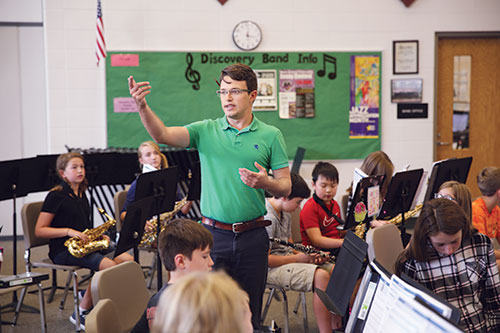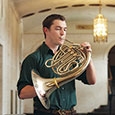There is no greater moment of relief after graduating with a music education degree than signing the contract for a first teaching job. Although I am fortunate that my first job is as the assistant director at a middle school with a strong program, my first year had a significant learning curve, and I learned many difficult lessons along the way. Here are some tips I wish I had known.

Classroom Management
We took the classes and observed great teachers while in college, but there is no substitute for trying classroom management for yourself. It takes hands-on experience and time to develop your voice and approach, as well as to internalize approaches learned from mentors. The following are classroom management procedures I have worked into my teaching.
First, be proactive rather than reactive. Set students up for success with clear procedures and instruction. Clear procedures will gradually give students independence, and strong expectations that are communicated frequently will help you as the teacher implement good management. Micromanaging students’ free time in the rehearsal hall with entrance/bell activities and limiting their time to set up will establish order early on.
For each band class, we have a two-minute countdown timer that starts when the tardy bell rings. It is projected onto a screen, and this helps keep students moving to their chairs and getting set up. As soon as students sit down, they are allowed to play at a moderate dynamic level and can play music out of our method book or practice music we are working on for an upcoming concert. This gives them time to work on passages that individually need attention. When the two minute timer is complete, I step up on the podium and raise my hand, which is the ensemble’s cue to stop playing and begin class time. Students are generally very good about getting to their seats on time and starting to play their instrument, which frees up time for me to address instrument problems, missing music, and anything else that might come up before class begins. A consistent daily routine leads to a productive rehearsal environment.
I have also learned that students generally act out either for attention or out of frustration. Sometimes an honest conversation with a student after class can help figure out which of these it is. Something I learned from my head director is to start and end a conversation with praise or encouragement – let such students know that their contribution to class is welcomed and wanted.
Students want structure and expect the teacher to handle classroom management concerns. Some minor misbehavior can be ignored, but if major infractions or chronic problems are not handled, students begin to believe the teacher cannot manage poor behavior, and the ones genuinely interested in learning will quit. Sometimes I felt uncomfortable tackling behavior problems, worrying that it would lead to all students being discouraged, but handling problems actually helps maintain a productive learning environment. The other students will appreciate it.
Finally, middle school students need to be taught rehearsal technique. I student taught at the high school level, where students have already learned to rehearse, so this caught me by surprise. Take a few moments to explain how rehearsal works, and what rehearsal etiquette consists of. I had to teach my band that students do not talk while other students are playing. To keep everyone involved in the rehearsal, I sometimes have students play a drone for tuning or sizzling the subdivision for pulse.
Content Knowledge
I liken the first year of teaching to feeling like Swiss cheese – you learn where the holes in your content knowledge are. For example, I had little experience with woodwind repair before I started teaching but learned a great deal on the job about diagnosing woodwind instrument problems and figuring out what I could repair quickly, what could be repaired during prep time, and what had to be sent to the shop. I also learned much about teaching good woodwind sounds. As a new teacher you have to be comfortable telling a student that you do not know the answer to a question, but then you must do your homework, find the answer, and return the next day with the information. Students will appreciate you going to the extra mile to get the information they need to be successful.
There is a gold mine of information available, but you have to be willing to pick up the tool to mine it. Talk with mentors and ask private lessons teachers for tips. Take professional development seriously. There is also a sea of books, apps, and podcasts for band directors. One podcast I enjoy is After Sectionals from Stiles Middle School. I particularly like their episodes that are recordings of full beginner class periods, which is akin to observing for field placement, but with the ability to go back and study the teaching method and style in detail.
Work/Life Balance
The first year of teaching can be an emotional roller coaster. I let my self-esteem be closely tied to the success or failures of my students and had to learn equanimity and become more even keeled in my responses to student achievements and progress. My head director provided support and perspective by sharing stories of his first year and subsequent career.
I also had to learn that it is okay to emulate great teachers. Many of the problems first-year teachers experience already have answers out there. Do not reinvent the wheel when you can search for an existing answer. The key is to adapt what you find to fit your situation.
Creating some clear work/life balance has helped as well. Finding time to exercise, cultivating hobbies outside of the profession, and taking care of yourself goes a long way toward feeling better at school. I found salsa dancing as a hobby and go once a week. I also limit the amount of time I spent on schoolwork during the weekends. Spending time reading, exploring the area with friends, or attending performances are excellent ways to recharge the batteries for the week ahead. However, I do spend time on Sunday sketching out the coming week so I have a framework for my more detailed lesson planning during the week. Spending a little bit of time planning ahead can save a lot of work time during the week.
Conclusion
The first year teaching is an incredible adventure, and it is hard to predict what will come of it. At times it can feel overwhelming and frustrating, especially when it comes to classroom management and content knowledge. However, there are many resources available to use and learn from, and finding mentors who are willing to listen and give advice is incredibly helpful. My father perhaps offered the best advice, telling me to “act like you belong in the room and be your honest, enthusiastic self.” Be like a sponge, absorb all the advice and wisdom you can, and enjoy the learning and growing you will do along with your students during your first year.






